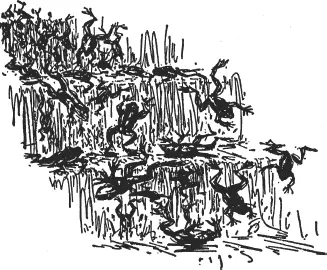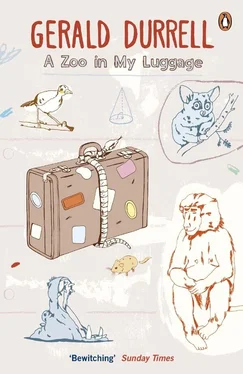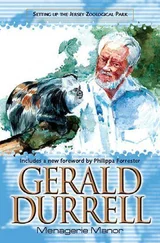Gerald Durrell - A Zoo in My Luggage
Здесь есть возможность читать онлайн «Gerald Durrell - A Zoo in My Luggage» весь текст электронной книги совершенно бесплатно (целиком полную версию без сокращений). В некоторых случаях можно слушать аудио, скачать через торрент в формате fb2 и присутствует краткое содержание. Жанр: Природа и животные, на английском языке. Описание произведения, (предисловие) а так же отзывы посетителей доступны на портале библиотеки ЛибКат.
- Название:A Zoo in My Luggage
- Автор:
- Жанр:
- Год:неизвестен
- ISBN:нет данных
- Рейтинг книги:4 / 5. Голосов: 1
-
Избранное:Добавить в избранное
- Отзывы:
-
Ваша оценка:
- 80
- 1
- 2
- 3
- 4
- 5
A Zoo in My Luggage: краткое содержание, описание и аннотация
Предлагаем к чтению аннотацию, описание, краткое содержание или предисловие (зависит от того, что написал сам автор книги «A Zoo in My Luggage»). Если вы не нашли необходимую информацию о книге — напишите в комментариях, мы постараемся отыскать её.
A Zoo in My Luggage — читать онлайн бесплатно полную книгу (весь текст) целиком
Ниже представлен текст книги, разбитый по страницам. Система сохранения места последней прочитанной страницы, позволяет с удобством читать онлайн бесплатно книгу «A Zoo in My Luggage», без необходимости каждый раз заново искать на чём Вы остановились. Поставьте закладку, и сможете в любой момент перейти на страницу, на которой закончили чтение.
Интервал:
Закладка:
My attention was drawn to this instructive sight by Bob’s moan of anguish when he discovered the catastrophe, a long-drawn howl of emotion that brought us all running from wherever we were. On the top step stood the plastic bowl, now completely empty of toads. From it the water gushed down the steps carrying Bob’s precious amphibians. The steps were black with toads, slithering, hopping and rolling over and over in the water. In this Niagara of amphibians Bob, with a wild look in his eye, was leaping to and fro like an excited heron, picking up toads as fast as he could. Picking up a clawed toad is quite a feat. It is almost as difficult as trying to pick up a drop of quicksilver; apart from the fact that their bodies are incredibly slippery, the toads are very strong for their size and kick and wriggle with surprising energy. In addition their hind legs are armed with small, sharp claws and when they kick out with these muscular hind legs they are quite capable of inflicting a painful scratch. Bob, alternately moaning and cursing in anguish, was not in the calm collected mood that is necessary for catching clawed toads, and so every time he had scooped up a handful of the creatures and was bounding up the steps to return them to their bath, they would squeeze from between his fingers and fall back on to the steps, to be immediately swept downwards again by the water. In the end it took five of us three-quarters of an hour to collect all the toads and put them back in their bowl, and just as we had finished and were soaked to the skin it stopped raining.

‘If you must release two hundred and fifty specimens you might at least choose a fine day and an animal that is reasonably easy to pick up,’ I said to Bob bitterly.
‘I can’t think what made me do such a silly thing,’ said Bob, peering dismally into the bowl in which the toads, exhausted after their romp, hung suspended in the water, peering up at us in their normal pop-eyed, vacant way. ‘I do hope they’re not damaged in any way.’
‘Oh, never mind about us. We can all get pneumonia galloping about in the rain, just as long as those repulsive little devils are all right. Would you like to take their temperatures?’
‘You know,’ said Bob frowning, and ignoring my sarcasm, ‘I’m sure we’ve lost quite a lot … there doesn’t seem to be anything like the number we had before.’
‘Well, I’m not going to help you count them. I’ve been scratched enough by clawed toads to last me a lifetime. Why don’t you go and change and leave them alone? If you start counting them you’ll only have the whole damn lot out again.’
‘Yes,’ said Bob, sighing, ‘I suppose you’re right.’
Half an hour later I let Cholmondely St John, the chimp, out of his cage for his morning exercise, and stupidly took my eye off him for ten minutes. As soon as I heard Bob’s yell, the cry of a mind driven past breaking point, I took a hasty look round and, not seeing Cholmondely St John, I knew at once that he was the cause of Bob’s banshee wail. Hurrying out on to the verandah I found Bob wringing his hands in despair, while on the top step sat Cholmondely, looking so innocent that you could almost see his halo gleaming. Half-way down the steps, upside down, was the plastic bowl, and the steps below it and the compound beyond were freckled with hopping, hurrying toads.
We slithered and slipped in the red mud of the compound for an hour before the last toad was caught and put in the bowl. Then, breathing hard, Bob picked it up and in silence we made our way back to the verandah. As we reached the top step Bob’s muddy shoes slipped under him and he fell, and the bowl rolled to the bottom, and for the third time the clawed toads set off joyfully into the wide world.
Cholmondely St John was responsible for another escape, but this was less strenuous and more interesting than the clawed toad incident. In the collection we had about fourteen of the very common local dormouse, a creature that closely resembled the European dormouse, except that it was a pale ash grey, and had a slightly more bushy tail. This colony of dormice lived in a cage together in perfect amity and in the evenings gave us a lot of pleasure with their acrobatic displays. There was one in particular that we could distinguish from all the others for he had a very tiny white star on his flank, like a minute cattle brand. He was a much better athlete than the others and his daring leaps and somersaults had earned our breathless admiration. Because of his circus-like abilities we had christened him Bertram.
One morning, as usual, I had let Cholmondely St John out for his constitutional and he was behaving himself in an exemplary fashion. But a moment came when I thought Jacquie was watching him, and she thought I was. Cholmondely was always on the look-out for such opportunities. When we had discovered our mistake and had gone in search of him we found we were too late. Cholmondely had amused himself by opening the doors of the dormouse sleeping-compartments and then tipping the cage over so that the unfortunate rodents, all in a deep and peaceful sleep, cascaded out on to the floor. As we arrived on the scene they were all rushing frantically for cover while Cholmondely, uttering small ‘Oooo’s’ of delight, was galloping around trying to stamp on them. By the time the ape had been caught and chastised there was not a dormouse in sight, for they had all gone to continue their interrupted slumbers behind our rows of cages. So the entire collection had to be moved, cage by cage, so that we could recapture the dormice. The first one to break cover from behind a monkey cage was Bertram, who fled down the verandah hotly pursued by Bob. As he hurled himself at the flying rodent, I shouted a warning.
‘Remember the tail … don’t catch it by the tail …’ I yelled. But I was too late. Seeing Bertram wriggling his fat body behind another row of cages Bob grabbed him by his tail, which was the only part of his anatomy easily grabbed. The result was disastrous. All small rodents, and particularly these dormice, have very fine skin on the tail, and if you catch hold of it and the animal pulls away the skin breaks and peels off the bone like the finger of a glove. This is such a common thing among small rodents that I am inclined to think it may be a defence mechanism, like the dropping of the tail in lizards when caught by an enemy. Bob knew this as well as I did, but in the excitement of the chase he forgot it, and so Bertram continued on his way behind the cage and Bob was left holding a fluffy tail dangling limply between finger and thumb. Eventually we unearthed Bertram and examined him. He sat plumply in the palm of my hand, panting slightly; his tail was now pink and skinless, revoltingly reminiscent of an ox-tail before it enters a stew. As usual when this happens, the animal appeared to be completely unaffected by what is the equivalent, in human terms, of having all the skin suddenly ripped off one leg, leaving nothing but the bare bone and muscle. I knew from experience that eventually, deprived of skin, the tail would wither and dry, and then break off like a twig, leaving the animal none the worse off. In the case of Bertram, of course, the loss would be a little more serious as he used his tail quite extensively as a balancing organ during his acrobatics, but he was so agile I did not think he would miss it much. But, from our point of view, Bertram was now useless, for he was a damaged specimen. The only solution was to amputate his tail and let him go. This I did, and then, very sorrowfully, we put him among the thick twining stems of the bougainvillaea that grew along the verandah rail. We hoped that he would set up house in the place and perhaps entertain future travellers with his acrobatic feats when he had grown used to having no tail.
Читать дальшеИнтервал:
Закладка:
Похожие книги на «A Zoo in My Luggage»
Представляем Вашему вниманию похожие книги на «A Zoo in My Luggage» списком для выбора. Мы отобрали схожую по названию и смыслу литературу в надежде предоставить читателям больше вариантов отыскать новые, интересные, ещё непрочитанные произведения.
Обсуждение, отзывы о книге «A Zoo in My Luggage» и просто собственные мнения читателей. Оставьте ваши комментарии, напишите, что Вы думаете о произведении, его смысле или главных героях. Укажите что конкретно понравилось, а что нет, и почему Вы так считаете.










